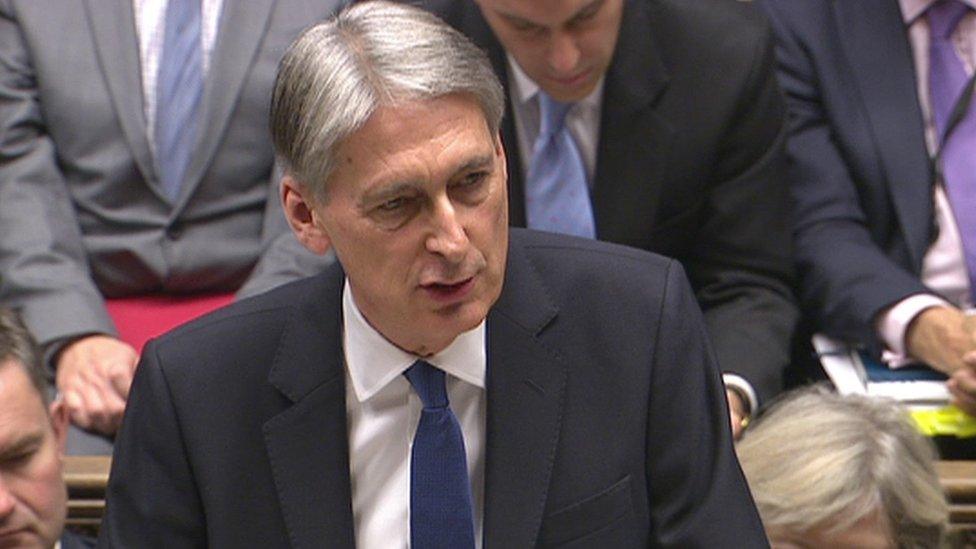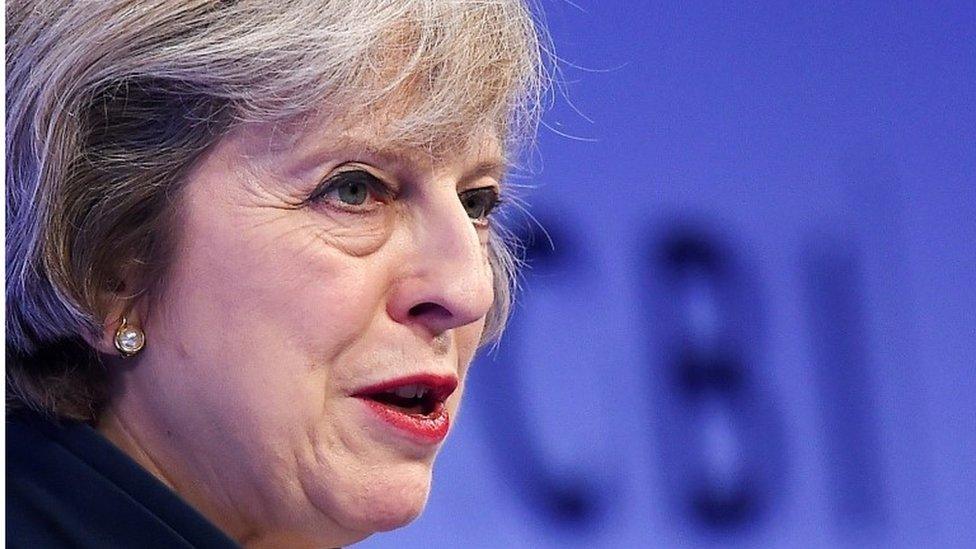Philip Hammond paints bruising backdrop
- Published

Ouch!
There was no secret that the picture today's Autumn Statement would paint would not be pretty. But more than £100bn of extra borrowing, roughly equivalent to the entire NHS budget - nearly £60bn of that the costs of Brexit - make a brutal backdrop for Theresa May's government as it only just gets going.
Remember all the figures ought to be taken with a giant pinch of salt. Forecasts like these have so often been wrong. And no one is forecasting a recession.
But what the chancellor said today and the Office for Budget Responsibility has calculated have big implications.
First off, with the goal of balancing the books now an aspiration to be met as "early as possible", next Parliament, the Tories will be going into the next election, a decade after they took charge, without having kept the central promise they made 10 years before of clearing the deficit.
Yes, you read that right - a full decade. As political promises go, that is a less than glorious record.
Shaky finances
Voters will see the national debt hitting 90% of GDP, not shy of £2 trillion, 10 years after being told that tough spending cuts were worth it, because within five years we would be on our way back to the mythic sunlit uplands.
There is a separate debate about whether that was ever achievable, and how much Brexit can be blamed for the fact Mr Hammond has pushed those targets back again. But at the very least, it means the Conservatives will still be borrowing, and borrowing significantly, busting their own timetable by at least five years.
And with wages predicted to slow, and inflation expected to rise, the public will feel the pinch too. Simply, if today's forecasts are right, the government's finances are set to be shaky for a lot longer, and more voters will feel skint.
Despite Theresa May's repeated desire to help families who are finding it hard to make ends meet, there were few measures that will make a big difference.
Privately, Treasury sources acknowledge they haven't done that much, despite Number 10's hopes. The truth is that they didn't have much cash to play with.
And Mr Hammond's ambitions to rebuild the fundamentals of the economy were clearly his priority, rather than major concessions to help some groups of voters feel a bit more flush.
Indeed, the charts that estimate who is bearing the brunt of the government's policies suggest that when everything is taken into consideration, not just today's measures, the three poorest groups are all slightly worse off. The only group that loses more is the top 10%.
Pensions hint
Beyond all the charts and tables and documents, though, Mr Hammond dropped one giant hint which is perhaps politically one of the most important things of the day.
He was talking about the "triple lock", the guaranteed increases in the state pension, seen by many in Westminster privately to be completely unaffordable in the longer term, but few will yet say it in public.
He said: "And we will meet our pledge to our country's pensioners through the triple lock. But as we look ahead to the next Parliament, we will need to ensure we tackle the challenges of rising longevity and fiscal sustainability.
"And so the government will review public spending priorities and other commitments for the next Parliament in light of the evolving fiscal position at the next Spending Review."
That sounds pretty bland, but the implications are anything but. It holds out the possibility that the Tories could look at ditching those guarantees and "other commitments", perhaps the ring fence of the NHS Budget, when they look at what the country can afford after 2020.
It was only a hint, but in time it may become a very important one. Mr Hammond rarely says anything by mistake.
But, without fighting that political battle, there was plenty that was bruising enough from today's announcements, plenty to make the government's life harder, and indeed, potentially those of plenty of voters too.
PS As ever, the documents published alongside the statement bear close examination. In the coming days more important nuggets may emerge.
But a few quick ones that caught our eye - the administration of Brexit is expected to cost the taxpayer £412m. The government has set aside £60m a year for grammar schools to expand.
- Published21 November 2016

- Published21 November 2016